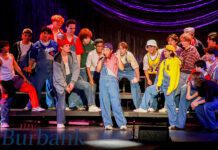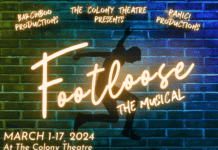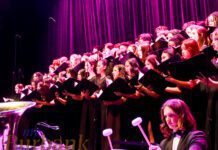Retired teacher and Burbank resident David Meyerhof has a family history that includes a Nobel Prize and perilous escapes from the Nazis in Germany and France during World War II. It’s the kind of material that would make a great book or movie, but Meyerhof has used it to inspire his poetry.
Both Meyerhof’s father and grandfather wrote poetry, so it was only natural that he would start writing poetry around the time he was in the 3rd grade. He began “seriously writing poetry,” as he put it, in 2006 when his father became ill. His father’s illness and death are what eventually resulted in his first book of poetry, Look Beyond, that was published in 2012.
“I wrote about fighting death,” said Meyerhof, as we sat in the Coral Cafe one morning not long ago, and he related the story of his family.
David’s grandfather was Otto Meyerhof, a German scientist who is considered as the “Father of Biochemistry,” was awarded the Nobel Prize in 1922 in Physiology or Medicine for his discoveries about how sugar is converted into energy in the human body. His father, Walter Meyerhof, was a professor of Physics at Stanford University for 43 years. David taught Mathematics and Science for 33 years at Florence Nightingale Middle School in Highland Park.
He probably wouldn’t even be here today if his grandparents had not been able to escape from Germany in 1938, as the persecution of Jews intensified prior to the start of World War II. By 1940, when France surrendered to the Germans, his grandparents were in Switzerland, but his father was in college in Paris. His father was sent to a detention camp controlled by the Vichy French government. He managed to escape by simply walking out of the back of the camp into the woods, making his way eventually to Switzerland. Ironically, his parents had been working on getting papers that would secure his release, so 18 year-old Walter managed to sneak back into the camp and wait 2 more months for his “official” release.
After his release, Walter tried to leave France by walking across the Pyrenees Mountains to Spain and Portugal, with the help of forged papers and guides provided by American Varian Fry, who eventually helped an estimated 2,000 Jews escape the Nazis. His escape was foiled and he ended up before a French judge. Thanks to friends of his parents, he and his companions were released.
Eventually, his father left Portugal on a ship. Walter missed the first boat, according to his son, because he met a girl in a bar. Walter had to wait 3 more months before the next boat took him to the United States and safety.
David’s mother, Miriam Meyerhof’s escape from Germany was equally harrowing. As a teenager, Miriam was living in Berlin in 1938. Her neighbors warned her to stay at home the night of November 9, “Kristallnacht,” when thousands of Jewish homes, businesses, and synagogues were destroyed. An estimated 60,000 Jews were rounded up and sent to camps that night. She was able to get out of Germany and go to England thanks to the Kindertransport (children’s transport) that saved the lives of nearly 10,000 Jewish children in the nine months leading up to the start of World War II. The cut-off age was 16, but somehow 17 year-old Miriam was able to get out.
Once safely in England, she went to a boarding school. Later she began working in a nursery school run by Anna Freud, daughter of Sigmund Freud. She later started her own child care in England. She and Walter re-connected and were married in 1947 in Scotland. The Meyerhofs came to America and settled in Menlo Park, California, where she still lives today.
During the last two months of Walter Meyerhof’s life in 2006, as he was dying from Parkinson’s Disease, his son David was unable to sleep. He wrote poems at night to help him deal with the imminent death of his father. His book, Look Beyond, is a collection of his poems that helped him get through this personal tragedy.
“My poems give people a way of dealing with difficulties,” said David, “They give people a way of handling hardship — because I’ve been there.”
His poem, “When Your World is Turned Upside Down, How Do You Make It Right Side Up?” was written the day, 2 years ago, after his mother fell and broke her hip. Prior to that, she had been living an active life.
The lives of his parents have influenced David’s poetry. He is now a “Holocaust Remembrance” speaker in Burbank schools. He has read his poems at Temple Beth Emet in Burbank, and last April he went to Sacramento to read a poem about his mother and Kristallnacht before the California State Assembly on Holocaust Remembrance Day.
One of David’s poems will be read October 5, in Germany, when the German Society of Biochemistry and Molecular Biology presents the Otto Meyerhof Prize to a young scientist under the age of 40. . The new award is in remembrance of Otto Meyerhof’s outstanding contributions to science. Otto Meyerhof, who died in 1951, was only 38 years old when he won the Nobel Prize, one of the youngest people to receive that honor. David is also involved with the World Kindertransport Day Committee.
His book, Look Beyond, which is self-published with the Xlibris Corp., is available on Amazon.com. David is currently working on his second book of poems. His Facebook page is https://www.facebook.com/DavidMeyerhofLookBeyond.






















